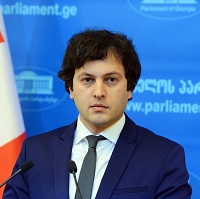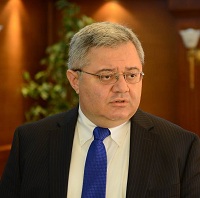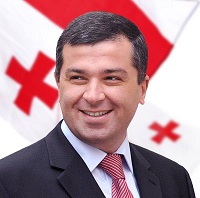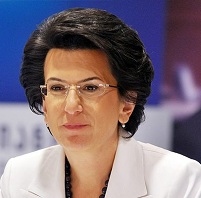
Parliamentary Speakers. Photo: Civil.ge compilation
Following several months of political debates, the Parliament of Georgia approved on October 13 the constitutional amendments with 117 lawmakers voting in favor and two against it.
Under the new constitution, direct presidential elections are to be abolished and the country will transfer to fully proportional parliamentary representation, completing its evolution towards a parliamentary system of government.
Civil.ge contacted incumbent and former parliamentary chairpersons and asked them to assess the constitutional reform process, as well as the overall text of the constitution. Below we offer the remarks provided by Irakli Kobakhidze, Davit Usupashvili, Davit Bakradze and Nino Burjanadze.
Irakli Kobakhidze
Parliamentary speaker from 2016, one of the leaders of the ruling Georgian Dream – Democratic Georgia party.
 The key goal of the constitutional reform was to improve the democratic standards and to strengthen the Georgian democracy.
The key goal of the constitutional reform was to improve the democratic standards and to strengthen the Georgian democracy.
Today, we have a constitution, which is not in line with fundamental principles of constitutionalism, including with the principle of separation of powers that the Venice Commission emphasized in its final opinion in 2010. Therefore, our main task was to improve these shortcomings and to establish a system, which would ensure the country’s democratic development in the long-term perspective and prevent the return of autocracy.
The Constitutional Reform Commission and the Parliament of Georgia guided its work on this positive and very ambitious agenda, and the document that was developed achieves this very purpose entirely.
Under the current constitution, in the presence of relevant political will, it is possible to establish an autocratic system, while the new text of the constitution completely rules it out. This is the biggest achievement of the constitutional reform process.
A very sophisticated system of parliamentary form of government will be introduced in line with the best European practice. We are also moving to a [fully] proportional electoral system that is one of the major achievements of this constitutional reform as well. No government has managed to pursue this decision until today.
There is not a single article in the new constitution, through which the ruling party improves its subjective political positions. Moreover, it contains a number of articles, which weaken the ruling party positions and strengthen the opposition’s role in the political processes. All this is being done to further strengthen the democratic system in Georgia.
Once again, this is a system, which ensures irreversible development of democratic principles in our country. With this reform, we are changing the constitutional tradition and the constitutional culture in Georgia.
Davit Usupashvili
Parliamentary speaker in 2012-2016, leader of the opposition Development Movement party.
 We failed to avoid politically grave end of the constitutional reform process.
We failed to avoid politically grave end of the constitutional reform process.
It did not happen because of bad people. It happened because of the bad system – the one-party rule. Such systems run on similar spirit, be it under the United National Movement or under the Georgian Dream.
The ruling party failed to realize the significance of the constitutional reform process and the absolute necessity of broader political consensus. Moreover, the constitution, adopted in 1995, has been rewritten anew – including what needed to be changed and what had to be maintained as the core legacy of our statehood.
The fact of the matter is that the attitude of a great part of the society towards the constitution was sacrificed to the political disagreement on one of the issues – the electoral system during the next parliamentary elections in 2020. The people, who run the state of affairs in the country, should have realized that it was crucial to reach an agreement on the matter; or to separate the issue from the constitutional reform process and regulate it in the election code.
In that case, the constitution would not be doomed to being torn to pieces in the ensuing politically-driven process, and the political process itself would be channeled in a less confrontational course.
Regretfully, the President of Georgia, made a serious tactical mistake at the very last moment. On October 5, the Venice Commission offered the Parliament and the President a five-point compromise plan, which included the proposal to postpone the decision on the electoral system of the next parliamentary elections and regulate it in the election code, instead of the new constitution. The President should have supported the proposal before the Venice Commission’s October 6 session, and incorporated it in his veto objections.
The President, however, chose a different path and demanded in his objections to constitutionally guarantee the introduction of fully proportional elections in 2020. With that, he maintained his and the opposition parties’ position, but released the government from the political pressure of the Venice Commission and the international community both in the veto-related developments and the subsequent political and electoral processes.
In the end, we received the constitution, the election system and the international political environment that is favorable to the ruling team, as well as the entire political spectrum victoriously defeated but one…
Nevertheless, increased alienation of the public towards the constitution would be equally damaging as the constitutional reform process itself. Therefore, we should work on rectifying rather than multiplying our mistakes and the mistakes of others. This is exactly why I think the President acted rightly when he signed the the final version of the constitution regardless of his objections and refrained from harming the political legitimation of the document as the legal foundation of statehood.
Davit Bakradze
Parliamentary speaker in 2008-2012, one of the leaders of the opposition European Georgia party.
 Every constitution has three grounds for legitimation. First, whether people agree with it; second, whether the political spectrum agrees with it or whether there is a political consensus about the document; and third, what the international community thinks about it.
Every constitution has three grounds for legitimation. First, whether people agree with it; second, whether the political spectrum agrees with it or whether there is a political consensus about the document; and third, what the international community thinks about it.
If we look at this constitution, absolute majority of Georgian population is against indirect presidential elections. Absolute majority of the country’s population thinks that the President should be elected directly and therefore, scrapping these elections means that the new constitution goes against the will of the majority.
The second relates to consensus between political actors, and here, we also see that there is an absolute anti-consensus; on the one side, there is the Georgian Dream, and on the other – the entire opposition spectrum, all opposition political parties, the President, the Public Defender, non-governmental organizations; so, there is not even a partial consensus on this matter.
We have a very clear picture; when the constitution is adopted by one party, and when all other parties and elected institutions, such as the President and the Public Defender, are against it, the second step of legitimation, which implies the political consensus, is also absent.
Third, as far as the international opinion is concerned, partial progress could be observed in the last version, because the last version of the constitution is better than the initial one proposed by the Georgian Dream. There is a relative improvement in the Venice Commission conclusion, but overall it does not reflect the international community’s opinion.
So, if we look at these components, we will see that none of them are fulfilled by the new constitution.
It is, therefore, natural that the assessment of the new constitution will be negative.
Nino Burjanadze
Parliamentary speaker in 2001-2008, leader of the opposition Democratic Movement – United Georgia.
 Generally, the constitution should be a consensual document. Constitution, in its classical sense, is a document which the entire society agrees upon and considers it to be the major law of a given country.
Generally, the constitution should be a consensual document. Constitution, in its classical sense, is a document which the entire society agrees upon and considers it to be the major law of a given country.
It is very regretful that the Georgian constitution has been turned into a document of discord rather that consent. It can be easily said that it is a constitution of the Georgian Dream, it is a partisan constitution, which takes into account neither state nor political party interests.
It undermines the principles of checks and balances; it undermines the presidency; it undermines the possibility of holding fair elections in the country and the possibility of allowing the people a free choice.
Therefore, my assessment of the constitution is clearly negative.

 RSS
RSS Mobile
Mobile Twitter
Twitter Facebook
Facebook